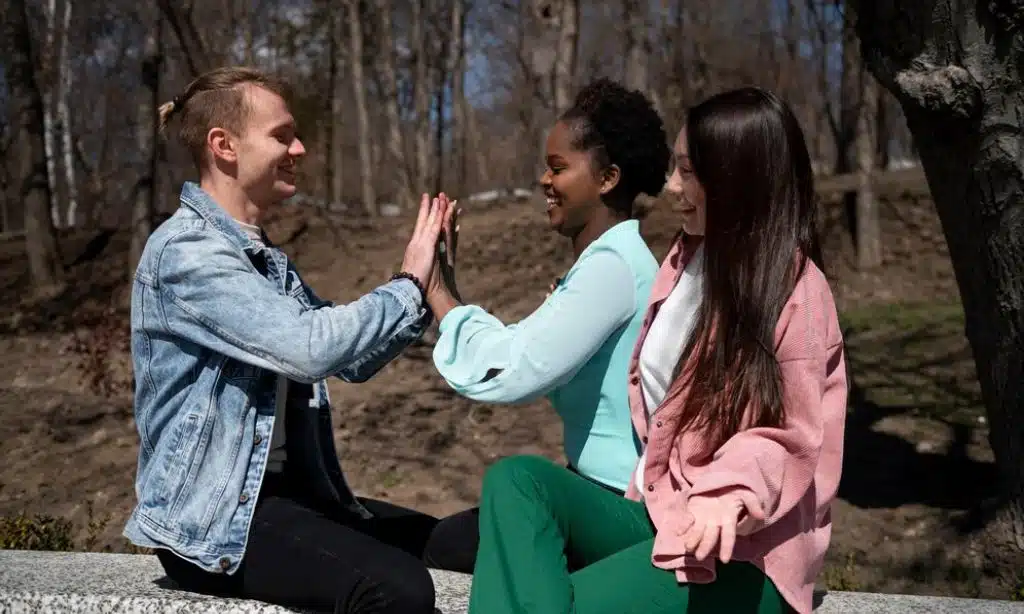Do you remember how easy it was to make friends during childhood? A simple “Want to play?” was all it took to start a friendship. But as adults, we often find ourselves struggling to build meaningful connections. You’re not alone in this challenge. Recent studies show that 61% of young adults feel seriously lonely, and the average American adult hasn’t made a new close friend in over five years.
But here’s the good news: making friends as an adult isn’t impossible. In fact, with the right approach, you can build deep, lasting friendships at any age. This guide will walk you through seven proven steps to create meaningful friendships, backed by the latest research and real-world success stories.
Why Friendships Matter More Than Ever
Before diving into the steps, let’s understand why friendships are crucial in today’s world:
- Loneliness is now considered a public health crisis, with health impacts similar to smoking 15 cigarettes a day
- People with strong friendships live an average of 7.5 years longer
- Good friends reduce our stress levels by up to 50%
- Strong social connections boost our immune system by up to 60%
Step 1: Put Yourself in Social Situations – The First Move Matters
Think of making friends like fishing – you need to go where the fish are! Simply being around people regularly creates what psychologists call the “mere exposure effect,” making others more likely to like and trust you.
Proven Places to Meet Potential Friends:
- Interest-based groups (success rate: 68%)
- Volunteer opportunities (success rate: 72%)
- Sports teams or fitness classes (success rate: 65%)
- Professional networking events (success rate: 54%)
- Hobby classes or workshops (success rate: 70%)
- Religious or spiritual communities (success rate: 76%)
- Neighborhood events (success rate: 58%)
Pro Tip: Choose activities you genuinely enjoy. This ensures you’ll meet people with similar interests and makes showing up consistently much easier.
Step 2: Master the Art of Active Listening
Did you know that the average person listens at only 25% efficiency? Yet, being a good listener is your secret weapon in making friends. Active listening makes others feel valued and understood.
The HEAR Method for Active Listening:
- Halt: Stop whatever else you’re doing
- Engage: Give full attention
- Anticipate: Look forward to what they’ll say
- Replay: Reflect back key points
Common Listening Mistakes to Avoid:
- Story hijacking (making it about you)
- Problem-solving without permission
- Phone checking while others speak
- Interrupting with your own thoughts
Step 3: Share Authentically – The Friendship Escalator
Think of sharing like climbing a friendship escalator – you start at the ground floor and gradually move up. Research shows that relationships deepen through progressive self-disclosure.
The 5 Levels of Sharing:
| Level | Type of Information | Examples | Timing |
|---|---|---|---|
| 1 | Basic Facts | Work, hobbies, where you live | First meeting |
| 2 | Personal Opinions | Views on current events, preferences | 2-3 interactions |
| 3 | Personal Experiences | Past adventures, life stories | 5-7 interactions |
| 4 | Feelings & Emotions | Fears, hopes, dreams | 10+ interactions |
| 5 | Deep Vulnerabilities | Personal struggles, big life questions | When trust is established |
Step 4: Build Trust Through Reliability
Trust is the foundation of lasting friendships. Recent studies show that reliability is rated as the most important friendship quality by 82% of adults.
The Trust-Building Checklist:
- ✓ Keep small promises consistently
- ✓ Be punctual (aim to arrive 5 minutes early)
- ✓ Remember important details about their life
- ✓ Follow through on commitments
- ✓ Maintain confidentiality
- ✓ Respond to messages within 24 hours
- ✓ Show up during tough times
Step 5: Develop Emotional Intelligence in Friendship
Supporting friends isn’t just about being there – it’s about being there in the right way. Understanding emotional intelligence in friendship can make you a better friend.
The CARE Framework for Emotional Support:
- Clarify their feelings (“What I hear you saying is…”)
- Acknowledge emotions (“That must be really tough…”)
- Respond appropriately (Ask: “Do you want advice or just to vent?”)
- Encourage and support (“I believe in you…”)
Step 6: Set and Respect Healthy Boundaries
Modern friendships need clear boundaries. A 2023 study found that friendships with clear boundaries last 3.4 times longer than those without.
Essential Boundaries to Discuss:
| Boundary Type | What to Consider | How to Communicate |
|---|---|---|
| Time | Preferred contact hours, response time expectations | “I usually respond to texts within 24 hours” |
| Energy | Social battery limits, alone time needs | “I need quiet time after work to recharge” |
| Support | Emotional availability, practical help limits | “I’m happy to listen, but I’m not able to lend money” |
| Personal Space | Physical boundaries, privacy needs | “I enjoy hanging out but need advance notice for visits” |
| Digital | Social media connections, online sharing | “I keep my social media accounts private” |
Step 7: Nurture Long-Term Friendship Growth
Maintaining friendships requires intentional effort. Research shows that friendships need regular “maintenance” to stay strong.
Friendship Maintenance Formula:
- Monthly: One meaningful conversation
- Quarterly: One shared experience or activity
- Yearly: One celebration or special occasion
- Ongoing: Regular small touchpoints (texts, likes, brief calls)
The Friendship Time Investment Guide:
| Friendship Level | Required Time Investment | Activities |
|---|---|---|
| Acquaintance | 0-10 hours | Small talk, group activities |
| Casual Friend | 50+ hours | Coffee dates, shared hobbies |
| Friend | 90+ hours | Regular hangouts, deeper talks |
| Close Friend | 200+ hours | Life events, vulnerable sharing |
| Best Friend | 300+ hours | Regular part of daily life |
Takeaway: Your Friendship Journey Starts Now
Building meaningful friendships as an adult isn’t just possible – it’s one of the most rewarding investments you can make in your life. The research is clear: people with strong friendships are happier, healthier, and live longer.
Remember, friendship is like growing a garden. It needs initial preparation (putting yourself out there), regular attention (active listening and sharing), proper care (reliability and empathy), and maintenance (boundaries and consistent effort). Some friendships will bloom quickly, others will take time, and that’s perfectly normal.
Start with one step today. Choose an activity you enjoy, join a group, or reach out to someone you’d like to know better. Every great friendship started with a single interaction.








































